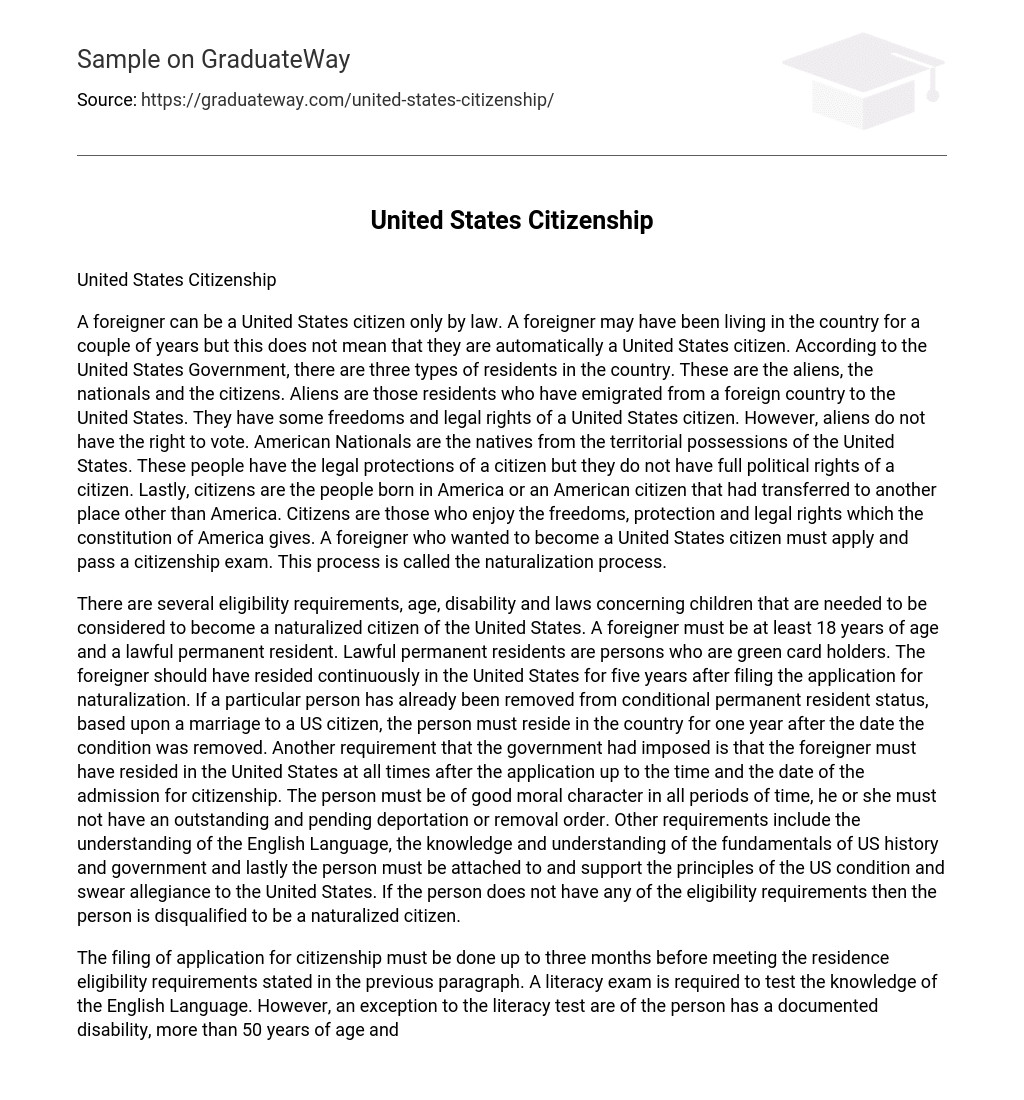A foreigner can be a United States citizen only by law. A foreigner may have been living in the country for a couple of years but this does not mean that they are automatically a United States citizen. According to the United States Government, there are three types of residents in the country. These are the aliens, the nationals and the citizens. Aliens are those residents who have emigrated from a foreign country to the United States. They have some freedoms and legal rights of a United States citizen. However, aliens do not have the right to vote. American Nationals are the natives from the territorial possessions of the United States. These people have the legal protections of a citizen but they do not have full political rights of a citizen. Lastly, citizens are the people born in America or an American citizen that had transferred to another place other than America. Citizens are those who enjoy the freedoms, protection and legal rights which the constitution of America gives. A foreigner who wanted to become a United States citizen must apply and pass a citizenship exam. This process is called the naturalization process.
There are several eligibility requirements, age, disability and laws concerning children that are needed to be considered to become a naturalized citizen of the United States. A foreigner must be at least 18 years of age and a lawful permanent resident. Lawful permanent residents are persons who are green card holders. The foreigner should have resided continuously in the United States for five years after filing the application for naturalization. If a particular person has already been removed from conditional permanent resident status, based upon a marriage to a US citizen, the person must reside in the country for one year after the date the condition was removed. Another requirement that the government had imposed is that the foreigner must have resided in the United States at all times after the application up to the time and the date of the admission for citizenship. The person must be of good moral character in all periods of time, he or she must not have an outstanding and pending deportation or removal order. Other requirements include the understanding of the English Language, the knowledge and understanding of the fundamentals of US history and government and lastly the person must be attached to and support the principles of the US condition and swear allegiance to the United States. If the person does not have any of the eligibility requirements then the person is disqualified to be a naturalized citizen.
The filing of application for citizenship must be done up to three months before meeting the residence eligibility requirements stated in the previous paragraph. A literacy exam is required to test the knowledge of the English Language. However, an exception to the literacy test are of the person has a documented disability, more than 50 years of age and has been living in the country for more than 20 years as a permanent resident alien, and if the person is more than 55 years of age and lived for 15 years as a permanent resident alien. Another required examination is the knowledge of US history and government. Exception to the US history and government examination is the documented disability and if the person is more than 65 years of age and have been a permanent resident alien for more than 20 years. A second chance is given to those who have failed the exams within 90 days. The immigration officers are required to make a decision regading the persons naturalization in a matter of 120 days after the interview.
If the application has been denied, the foreigner can appeal to another CIS officer within the same district office. The new officer must have a decision within 180 days after the date of filing the appeal. If the application is still denied, the person can seek for a review of the officer’s decision in the US district court where you reside in.
Works Cited:
U.S. Government Printing Office. “Citizenship”. Ben’s Guide to U.S. Government. 6 April 2000. <http://bensguide.gpo.gov/3-5/citizenship/citizenship.html>
Campbell, Boyd. “How to Become a US Citizen”. Immigration Law Center LLC. 2008. <http://www.visaus.com/citizen.html>





